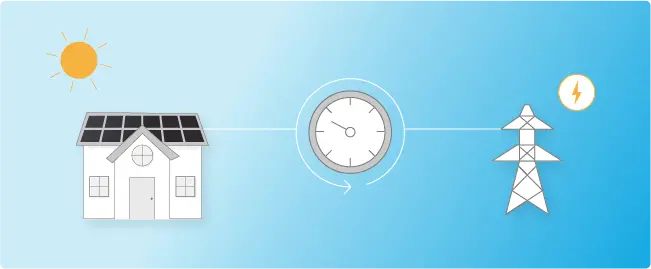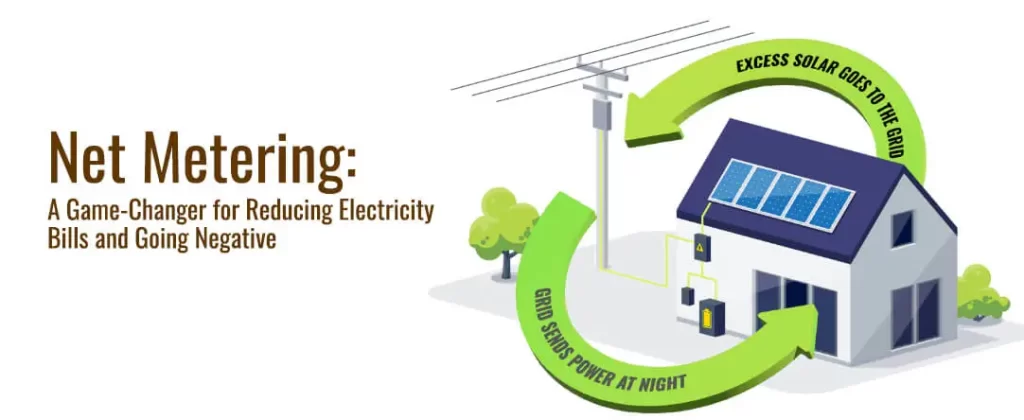Net Metering: A Comprehensive Guide 2025
In the world of renewable energy and sustainability, few concepts have been as transformative as net metering. It has revolutionized the way we use and benefit from green energy, especially solar power. Today, we’ll deep dive into the intriguing world of net metering, how it works, its various advantages and limitations, and how you can apply for it in Pakistan.
If you have any questions in mind read Net Metering FAQs.
نیٹ میٹرنگ گائنڈ کے لیے ہماری ویب سائٹ کا نیٹ میٹرنگ کا سیکشن وزٹ کریں۔
What is Net Metering?
Net metering is a utility billing mechanism that allows individuals and businesses generating their own energy, primarily through solar panels or wind turbines, to feed unused energy back into the grid. This excess power offsets the energy consumed when their renewable energy systems aren’t producing electricity, effectively “running the meter backwards.”
How Does Net Metering Work?
When a renewable energy system generates more power than is needed, the surplus is sent back into the grid for use elsewhere. The user’s electricity meter keeps track of this net difference as they “bank” their excess electricity during peak production times and withdraws it when needed.
For example, solar panels often generate more electricity during the sunny afternoon hours than a home can use. Net metering allows this surplus energy to be distributed to the grid, and in exchange, the home can pull from the grid at night or on cloudy days without incurring extra costs. in the following image the process explain very easy and understandable way.

The Benefits of Net Metering
Net metering has several compelling benefits:
- Cost Savings: Net metering can significantly reduce or even eliminate your electricity bill, as you can use your surplus energy instead of buying more from the grid.
- Energy Independence: By generating your own power, you’re less dependent on the local utility company and more resilient to power outages.
- Environmental Impact: Renewable energy systems reduce the amount of fossil fuel-derived electricity used, leading to a decrease in greenhouse gas emissions.
- Grid Health: Net metering can benefit the overall health of the power grid by providing additional electricity during peak production times, reducing the load and wear on the grid infrastructure.
- Economic Growth: The rise in demand for renewable energy systems drives job growth in green sectors.

The Drawbacks of Net Metering
While net metering has clear benefits, it’s not without its drawbacks:
- Initial Setup Cost: Renewable energy systems can be expensive to install, though these costs can be offset over time by savings on electricity bills.
- Intermittent Production: Solar and wind energy are dependent on weather conditions, so production can be inconsistent.
- Grid Compatibility: Some older electricity grids may have difficulty accepting the surplus energy produced by renewable systems.
- Regulatory Challenges: Some regions have complicated or unfavourable regulations regarding net metering.
Future of Net Metering: What to Expect?
As we look towards the future, the role of net metering is expected to grow in tandem with the rise in renewable energy technologies. The growing awareness of climate change and a global commitment to reduce carbon emissions will likely stimulate further advancements and adoption of renewable energy systems, hence promoting the use of net metering.
In addition, the constant progress in energy storage solutions, such as advanced battery technologies, may reshape the dynamics of net metering. With more efficient storage options, the energy produced during peak periods can be stored and used when needed, improving the self-sufficiency of individual renewable energy systems and potentially expanding the benefits of net metering.
CHECK YOUR ELECTRICITY MEPCO Bill Online
However, policy and regulatory challenges will continue to play a significant role in determining the pace of this growth. Forward-thinking legislation that supports the integration of renewables into the power grid and the implementation of net metering programs will be vital for the evolution of this space.
Overall, as we move into an era increasingly characterized by distributed generation, the role of net metering is poised to become more prominent, ultimately contributing to a more sustainable and resilient global energy landscape.
Net Metering in Pakistan: How to Apply?
In Pakistan, net metering is gaining traction as an excellent way to capitalize on abundant sunlight. To apply, start by contacting your local Distribution Company (DISCO). They’ll guide you through the Net Metering application process in Pakistan, which includes an evaluation of your premises, installing the renewable energy system, and connection to the grid.
Conclusion
Net metering is an ingenious solution that bridges the gap between renewable energy systems and the traditional power grid. While it has some drawbacks, the benefits – including environmental impact, cost savings, and energy independence – are significant. With the increased adoption of net metering across the world, we are one step closer to a sustainable and self-sufficient energy future.
